⚡ZurzAI.com⚡
Companies Similar to Rigetti Computing
QiO Technologies
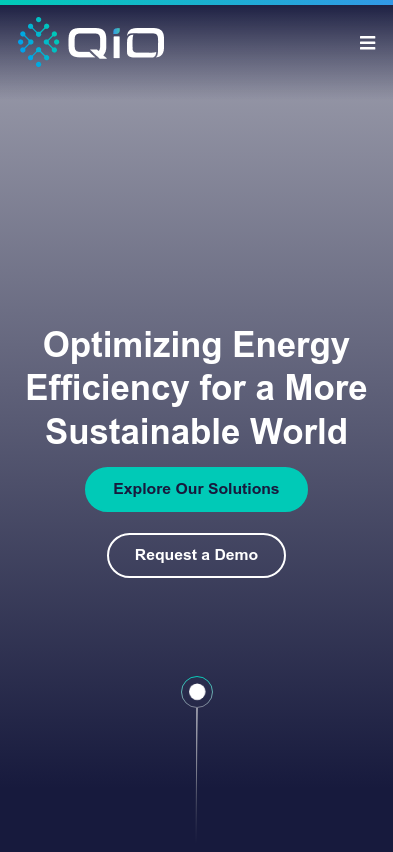
QiO Technologies offers a sustainability suite using AI to reduce greenhouse gas emissions. QiO Technologies is an AI sustainability tech company offering solutions to reduce greenhouse gas emissions.
QiO Technologies: Business Overview
1) Key Focus Area: QiO Technologies focuses on optimizing energy efficiency and promoting sustainability through intelligent software solutions. The company's main sectors of interest are data centers and industrial manufacturing, where it aims to enhance operational performance while reducing energy consumption and carbon footprints.
2) Unique Value Proposition and Strategic Advantage: QiO distinguishes itself with a commitment to pioneering AI-driven solutions that reduce energy consumption and operational costs. At the core, QiO offers a strategic advantage by seamlessly integrating AI into its systems to enhance efficiency, enabling clients to meet environmental, social, and governance (ESG) goals. This alignment with sustainability goals not only addresses cost concerns but also compliance with environmental regulations, making it appealing to organizations aiming for greener operations.
3) Delivery Methodology:
-
Products:
- ServerOptix™: Specifically targets data centers by optimizing server power management to significantly cut down energy use, enhance cooling efficiency, and maximize existing grid capacities without the need for additional infrastructure.
- Foresight Platform: Serves industrial sectors, offering comprehensive AI-driven analytics to improve energy management, predict maintenance needs, and optimize operational efficiency.
-
Approach:
- QiO's solutions are based on advanced AI algorithms that continuously analyze and optimize energy consumption in real-time. This ensures that operations are not just efficient but also adaptable to changing demands and operational conditions.
- Automation plays a crucial role with tools like automated controls and predictive maintenance, enhancing operational reliability and reducing unnecessary downtime.
- QiO emphasizes software compatibility across diverse systems and infrastructures, further allowing flexible integration into existing technological configurations.
-
Sustainability Commitment:
- QiO embeds sustainability as a foundational value and not simply a marketing afterthought. This approach is reflected in every product and partnership.
- The company's manifesto underscores transparency, continuous improvement, and collaboration to magnify efforts toward sustainability, reinforcing its strategic advantage as a sustainable solutions provider.
QiO Technologies positions itself as a vital partner in both the energy efficiency domain and the broader sustainability narrative, offering robust tools for companies that prioritize reducing their ecological impact while remaining competitive in the digital age.
Xanadu

Xanadu is an enterprise technology company specializing in photonic quantum computing solutions, aiming to bring advancements in computational capabilities.
Xanadu is focused on advancing quantum computing technology, with an emphasis on building and deploying photonic quantum computers. Their approach aims to push the bounds of computation by leveraging the properties of light, which can offer scalability and efficiency advantages over traditional quantum computing methods.
Their unique value proposition lies in their pioneering use of photonics for quantum computing. This technology utilizes photons to process information at quantum scales, which potentially allows for faster computations and reduced power consumption compared to other quantum computing methods. This differentiation is intended to provide them with a strategic advantage in developing scalable, practical quantum solutions suitable for a variety of complex computational problems.
Xanadu delivers on their value proposition through several key initiatives:
-
Photonics Platform: By focusing on photonics, they aim to overcome some limitations associated with other quantum computing techniques, such as the need for extremely low temperatures and complex cooling systems. Their photonics-based approach offers a theoretically more manageable pathway to scalable quantum computation.
-
PennyLane Software: They provide a software library, PennyLane, which integrates quantum hardware with machine learning platforms. The integration aims to facilitate practicality and accessibility, enabling researchers and developers to create advanced quantum algorithms and applications efficiently.
-
Open-Source Commitment: Xanadu’s commitment to open-source development allows broader community engagement, potentially accelerating innovation and adoption of their technology. This inclusive approach also seeks to catalyze improvements by leveraging collective expertise and fostering collaboration across the quantum computing landscape.
-
Research and Development: Continuous research efforts focus on expanding the capabilities and applications of their photonic quantum computing technology. By investing in cutting-edge R&D, Xanadu strives to remain at the forefront of technological advancements in quantum computing.
Overall, Xanadu’s strategic emphasis on photonic quantum computing, combined with their commitment to software development, collaborative innovation, and a scalable computational platform, defines their approach to delivering value in the quantum computing sector.
CosmosIQ.AI

CosmosIQ.AI is a startup focusing on AI-driven educational technologies, SaaS solutions, and mobile applications.
CosmosIQ positions itself within the AI technology sector, primarily focusing on providing data-driven insights and artificial intelligence solutions. Their key focus area revolves around leveraging advanced AI algorithms to deliver valuable analytics and insights for businesses seeking to enhance their decision-making processes.
Unique Value Proposition and Strategic Advantage
CosmosIQ emphasizes its distinctive blend of cutting-edge AI technology merged with deep industry expertise. The company's strategic advantage lies in its ability to tailor AI solutions to meet specific business needs, a capability underscored by their commitment to ensuring that AI is not just a tool, but a customized service that aligns with an organization's strategic goals. This promise of customization is central to their value proposition, setting CosmosIQ apart from other AI service providers who may offer more generic solutions.
Delivery on Value Proposition
To deliver on its value proposition, CosmosIQ utilizes a multi-faceted approach:
-
Custom Solutions Development: CosmosIQ collaborates closely with clients to understand their unique challenges and requirements, developing AI solutions that are directly aligned with their strategic objectives. This bespoke service model ensures that each solution is finely tuned to deliver maximum impact.
-
Data Integration Expertise: A major component of CosmosIQ's approach is its expertise in integrating disparate data sources. This capability allows them to deliver comprehensive, actionable insights by ensuring that AI models are fed with the most relevant and wide-ranging data sets.
-
Collaborative Partnerships: To further their mission, CosmosIQ builds deep partnerships with clients, emphasizing a collaborative approach to AI development and implementation. This strategy fosters a deeper understanding of client needs and industry nuances, resulting in more effective and relevant AI solutions.
-
Continuous Support and Evolution: CosmosIQ offers ongoing support post-deployment, ensuring that their solutions evolve with their clients' businesses and the changing technological landscape. This commitment to adaptability enhances the long-term value of their services.
By focusing on these strategic areas, CosmosIQ aims to ensure that their AI-driven solutions don't just provide immediate benefits, but also contribute to sustainable business growth by aligning with broader organizational goals. This careful alignment with the client's strategy emphasizes the company's aim to be viewed not merely as a service provider, but as a strategic partner in innovation and growth.
Tenstorrent

Tenstorrent is a computing company developing AI processors for faster training and adaptability to future algorithms. Tenstorrent is a computing company that develops AI processors designed to help in faster training and adaptability to future algorithms.
Executive Summary: Tenstorrent's Strategic Position in the AI and Semiconductor Market
Key Focus Area: Tenstorrent specializes in the development of high-performance hardware for artificial intelligence (AI). The company focuses on creating advanced computing solutions using AI Graph Processors, RISC-V CPUs, and software stacks designed to enhance the performance and flexibility of AI models. Their products are engineered for various applications, including data centers, AI development workstations, and high-performance computing (HPC) environments.
Unique Value Proposition and Strategic Advantage: Tenstorrent positions itself by providing open-source software stacks and customizable hardware solutions. This approach distinguishes it in the market, notably facilitating a more custom-driven environment for developers compared to some proprietary competitors. The company's architecture, such as the open-source TT-Metalium™ SDK and RISC-V IP (Ascalon), is designed for customization, scalability, and enhanced performance across a range of computations.
How They Deliver on Their Value Proposition: Tenstorrent offers several innovative solutions and strategic partnerships to deliver on their value proposition:
-
Product Offerings:
-
Hardware: Key products include the Tenstorrent Galaxy and TT-QuietBox, enhanced with the Wormhole™ processors. These systems are intended to offer dense, high-performance AI compute capacity, suitable for both single-user and multiple-model frameworks.
-
Software: Their open-source TT-Metalium™ platform gives developers the tools to create and modify kernels and models extensively. This accessibility allows for a wide range of computations, including non-machine-learning tasks.
-
-
Strategic Partnerships: Tenstorrent collaborates with companies like Moreh, challenging incumbents like NVIDIA in the AI data center market. They also work with LG to enhance AI chip capabilities for consumer electronics and automotive applications.
-
Investment and Growth Strategy: The company secured over $693 million in a Series D funding round, aiding its expansion and development activities. This capital infusion supports developing their product lineup, expanding global design centers, and bolstering open-source software capabilities.
-
Market Penetration: By leveraging open-source initiatives, Tenstorrent seeks to increase adoption of its hardware and software in AI and data center markets, aiming to expand its presence in various sectors, such as future mobility and commercial applications.
-
Innovation in AI and RISC-V Development: Tenstorrent engages in continuous research and development to push the boundaries of AI compute solutions, thereby attracting strategic and financial investment that fuels its innovative projects.
By integrating open-source technology with scalable and powerful hardware solutions, Tenstorrent aims to provide a flexible and compelling alternative to traditional AI hardware solutions, fostering a robust ecosystem for innovation in AI and semiconductor technologies.
Quantumics.AI
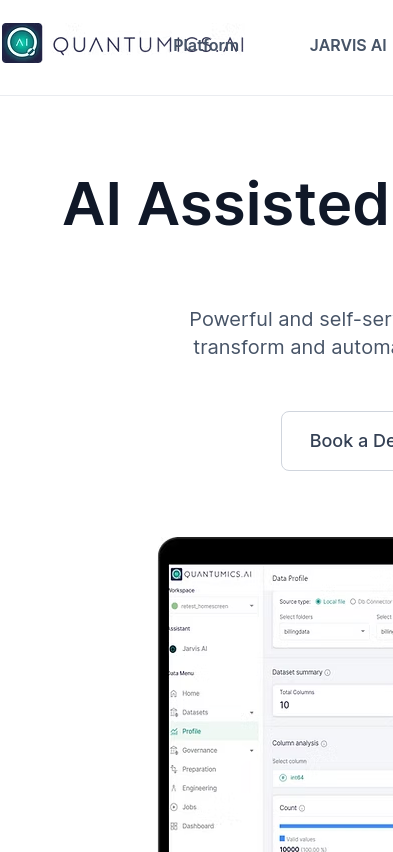
Quantumics.AI is a SaaS company aiding decision-making with predictive tools, AI (machine learning), and language processing programs.
Summary of Quantumics.AI's Business Proposition
Key Focus Area: Quantumics.AI concentrates on facilitating the entire data management process efficiently and effectively. Their primary focus is on offering an AI-assisted DataOps platform that emphasizes self-serviced access, discovery, profiling, transformation, and automation of data decision-making processes. This platform is designed to support business users by simplifying data operations without requiring extensive technical expertise. Key solutions include data preparation, governance, engineering, and automation primarily aimed at enhancing data-driven decision-making.
Unique Value Proposition and Strategic Advantage: The core value proposition of Quantumics.AI lies in its no-code, user-friendly platform that enables comprehensive data management. This approach allows business users to handle sophisticated data tasks without dependency on IT specialists or data engineers.
- No-Code Data Management: Users can prepare, cleanse, and manage datasets through simple, drag-and-drop interfaces, significantly lowering the barrier to data handling for business users.
- End-to-End DataOps: Spanning data ingestion, profiling, engineering, and governance, Quantumics.AI integrates entire data workflows into a unified platform to reduce complexity.
- Security and Compliance: Ensures enterprise-ready solutions with compliance to ISO 27001 and SOC 2 standards, providing assured data security and privacy.
- Generative AI Data Discovery: Through JARVIS AI, users can leverage conversational AI to boost efficiency in data discovery and insights extraction.
Delivery on Value Proposition: Quantumics.AI implements several operational avenues to ensure the delivery of its value propositions:
- Integrated Workspace: Business-specific project workspaces enable collaboration and provide a centralized repository for managing various datasets, enhancing organizational alignment.
- Data Preparation and Engineering: Offers a comprehensive set of pre-built rules and custom flow capabilities to standardize, transform, and engineer data with ease.
- Automated Data Processes: Automation of repetitive and routine data tasks allows businesses to streamline workflows and maintain consistency in data operations without manual intervention.
- Dynamic Dashboards: Provides visualization tools to transform datasets into insightful dashboards, ensuring actionable intelligence is readily available to stakeholders.
- Community and Open Source: Engages with an active community embracing open-source principles, which fosters continual product enhancement and accessibility.
Overall, Quantumics.AI presents a comprehensive, secure, and user-friendly suite aimed at maximizing data utility for strategic business decisions. Business users can leverage this platform for a streamlined data analytics journey, encompassing everything from preparation to governance, facilitated by an intuitive no-code interface and backed by robust compliance measures.
Raspberry AI

Raspberry AI helps retail companies design styles that are in high demand.
Raspberry AI Company Overview
Key Focus Area: Raspberry AI centers on utilizing generative AI to streamline and enhance the creative processes in the fashion industry. The company’s platform is geared towards fashion creatives and aims to facilitate the design process from conceptual sketches to photorealistic images, seamless print production, and AI-powered lifestyle photography.
Unique Value Proposition and Strategic Advantage: Raspberry AI’s unique value proposition is its ability to transform traditional labor-intensive design methods into efficient and cost-effective digital workflows. By leveraging AI, the platform significantly reduces the time and resources typically required in the fashion design process. Key features include:
- Design Automation: The capability to convert 2D sketches into photorealistic renderings instantly enables designers to save weeks of iterative prototype development.
- Cost Efficiency: The application reduces sample costs by 30%, achieving significant savings in production processes.
- Customizability: AI models are tailored to encapsulate a brand's unique style, providing companies with customized outputs that align precisely with their design ethos.
Delivery on Their Value Proposition: Raspberry AI delivers its promises through several advanced technological applications:
-
Sketch-to-Render Technology: This feature quickly converts sketches into high-fidelity renders, allowing designers to explore extensive creative possibilities without the necessity of physical samples. This not only improves design communication within teams but also accelerates the approval process with stakeholders.
-
Seamless Print Generation: The AI swiftly generates custom, royalty-free patterns that seamlessly repeat, providing fashion designers with a broad spectrum of print possibilities without traditional licensing constraints.
-
AI-Driven Lifestyle Photography: This functionality involves creating detailed, photorealistic lifestyle images using virtual models. By doing so, the platform enables brands to perform global, location-based photoshoots without physical constraints, supporting sustainability by reducing the carbon footprint associated with frequent travel.
-
Enhanced Design Tools: Raspberry AI incorporates tools for precise editing, infinite colorway adjustments, and the generation of technical drawings, all of which simplify complex design tasks, thus enhancing overall productivity for design teams.
-
Integrated Security and Privacy Measures: Raspberry AI guarantees full ownership and intellectual property rights to users over their creations, alongside robust privacy protocols ensuring data is neither shared nor used to train their AI models. For enterprise users, private cloud hosting solutions are available to enhance data security further.
By offering a comprehensive suite of tools designed to optimize and secure the design process, Raspberry AI positions itself as a strategic partner for fashion brands looking to innovate and compete in the fast-paced fashion industry.
EdgeQ

EdgeQ intends to fuse AI compute and 5G within a single chip. The company is pioneering converged connectivity and AI that is fully software-customizable and programmable.
1) What is this company's key focus area?
EdgeQ focuses on advancing wireless infrastructure, emphasizing the integration of 4G, 5G, and Artificial Intelligence (AI) within a robust, scalable, and economically efficient framework. The company positions itself at the intersection of connectivity and compute technology, providing solutions that fuse telecommunications with artificial intelligence enhancements.
2) What is their unique value proposition and strategic advantage?
-
Base Station-on-a-Chip: EdgeQ is credited with introducing the industry's first Base Station-on-a-Chip, combining 4G, 5G, and AI capabilities in a singular, compact silicon that oversees functionality traditionally managed by multiple devices. This offering grants unprecedented cost and power savings, utilizing just one-chip for infrastructure demands.
-
Open, Software-Defined Architecture: Their approach is uniquely software-defined and fully programmable, allowing operators to configure and upgrade networks effortlessly through software, circumventing the traditional costs associated with hardware changes. This provides flexibility in deployment and reduces operational burdens.
-
O-RAN (Open Radio Access Network) Compatibility: By aligning with the principles of O-RAN, EdgeQ supports standardized interfaces, which facilitate interoperability among different vendors, further reducing the complexity and costs associated with deploying and managing wireless network infrastructure.
3) How do they deliver on their value proposition?
-
Integrated Comprehensive Solution: EdgeQ's Base Station-on-a-Chip offers an all-in-one solution that integrates baseband processing, network processing units (NPUs), CPUs, and AI capabilities. This highly consolidated approach optimizes network deployment by providing scalability and efficiency.
-
Customization and Upgradability: EdgeQ utilizes a software-first approach that allows for considerable customization and over-the-air upgradability. Thus, enterprises can dynamically adjust spectrum usage and scale operations as needed without the need for physical infrastructure changes.
-
Mission-Critical Applications: By supporting private 5G solutions and power over ethernet setups, EdgeQ caters to mission-critical use cases requiring Ultra-Reliable Low Latency Communication (URLLC), making it viable for industries like industrial automation and real-time data processing.
-
Partnerships and Ecosystem Integration: Collaborations with industry leaders such as Vodafone emphasize EdgeQ's strategy to leverage its platform within existing and emerging infrastructure ecosystems, thereby validating their technologies' application and scalability in real-world deployments.
In summary, EdgeQ leverages its innovative Base Station-on-a-Chip technology, combined with a software-defined and open architecture, to deliver comprehensive, customizable, and cost-effective solutions for the evolving needs of wireless infrastructure. Their approach facilitates flexibility, adaptability, and enhanced networking capabilities for operators while aligning with modern telecommunications paradigms like O-RAN.
Liquid AI

Liquid AI focuses on developing advanced, general-purpose AI systems that align with human values and trustworthiness.
Liquid AI, an MIT spin-off based in Boston, primarily focuses on developing general-purpose AI systems that are capable, efficient, and scalable. Their efforts are centered around creating AI foundation models that leverage innovative architectures and theoretical foundations in machine learning, signal processing, and numerical linear algebra.
Key Focus Area: Liquid AI's main focus is the development of general-purpose AI systems through its Liquid Foundation Models (LFMs). These models are structured to handle various forms of sequential data across numerous industries, including financial services, biotechnology, and consumer electronics. Their LFMs, notably the LFM-7B, are designed to provide comprehensive AI functionalities that are both energy and memory efficient.
Unique Value Proposition and Strategic Advantage:
- Innovation in AI Architecture: Liquid AI emphasizes a shift from traditional transformer-based models, such as GPTs, to their own non-transformer-based architectures. This pivot reportedly allows their models to be highly efficient, offering superior performance with reduced computational demands.
- Multilingual and Multi-modal Capabilities: Liquid AI asserts that its LFMs excel in multiple languages, including English, Arabic, and Japanese, and are adaptable to various industry-specific applications.
- Low Memory Footprint: The architecture of LFMs ensures a minimal memory footprint, which is posited to lead to cost-efficiency in deployment and tuning processes.
- Strategic Collaborations and Funding: Liquid AI has garnered a significant $250M Series A funding primarily led by AMD Ventures, alongside collaborations with influential entities like Capgemini and ITOCHU, to scale their products and penetrate various markets effectively.
How They Deliver on Their Value Proposition:
- Model Deployment and Customization: Liquid AI offers models that can be finely tuned and deployed directly on-premises or on edge devices. Through their Liquid Engine, they provide high-performance AI solutions that are claimed to adapt to enterprise-specific needs with reduced latency and enhanced privacy.
- Comprehensive Model Stacks: The LFMs come with integrated inference and customization stacks that allow enterprises to adapt the technology for private, secure, and specific use cases.
- AI Integrated Platforms: Their products are available for trial and integration through several accessible platforms, such as Amazon Bedrock and the Liquid Playground, aiming to make LFMs versatile and easy to access for development teams.
- Rapport with Strategic Partners: They actively work on creating AI solutions in collaboration with partners, like their joint projects with Capgemini to develop new capabilities in AI domains such as edge solutions and enterprise AI transformations.
Liquid AI seems to position itself as a forerunner in the transition to advanced, efficient AI models tailored for broad applications, purporting to reduce carbon footprints associated with traditional AI infrastructure and facilitate easier deployment and customization for enterprises. Nonetheless, it's important to recognize these claims as part of a marketing narrative.
NVIDIA

NVIDIA is a leading producer of AI hardware, renowned for its GPUs and plays a pivotal role in the AI chip market, being a revenue and volume leader.
-
Key Focus Area: NVIDIA's primary focus is on accelerated computing technology designed to power artificial intelligence (AI) and other computationally intensive tasks across various sectors. They cater to industries such as healthcare, automotive, gaming, manufacturing, and more, capitalizing on their hardware and software capabilities to optimize AI and data processing workloads.
-
Unique Value Proposition and Strategic Advantage: NVIDIA distinguishes itself by offering cutting-edge hardware like GPUs and AI supercomputers, and supporting software platforms that enable efficient AI computation and application. Their strategic advantage lies in the development of tailor-made solutions such as NVIDIA RTX, the Omniverse platform for 3D workflows and collaborative design, and cloud-based AI services. NVIDIA’s partnerships with key tech giants like Microsoft and Google for AI and data processing enrich their service offering, enabling comprehensive solutions for enterprise AI needs.
-
How They Deliver on Their Value Proposition:
-
Product Range: The company offers a wide spectrum of products, including GeForce graphics cards for gaming, the DRIVE platform for autonomous vehicles, and the DGX platform for AI training. Their offerings extend to software, such as the AI Enterprise suite and specialized AI tools for various industries.
-
Platform Initiatives: NVIDIA advances AI applications through initiatives like Project DIGITS, allowing local and cloud-based AI computational tasks, and Cosmos, which accelerates AI development for physical systems like robotics and autonomous vehicles. Their efforts in the metaverse, through the Omniverse platform, demonstrate their commitment to virtual simulation and 3D development.
-
Innovative Solutions: NVIDIA emphasizes high-performance computing (HPC) with solutions like CUDA-based parallel computing and deep learning frameworks that enhance scientific research and design processes. Their focus on delivering AI tools for sectors like healthcare and entertainment showcases their ability to impact diverse fields.
-
Collaborations and Partnerships: They strategically align with industry leaders such as Microsoft, Google, and Oracle to integrate their technologies into broader enterprise ecosystems. These collaborations enhance NVIDIA's reach and influence in deploying scalable AI solutions.
-
Training and Support: NVIDIA supports the adoption of its technologies through extensive resources, including technical training, support for developers, and comprehensive solution catalogs that facilitate easier implementation of their platforms and products.
-
These strategic initiatives enable NVIDIA to maintain its position in advancing AI capabilities and catering to an increasingly digital-first world, impacting industries by solving complex computational problems and innovating upon AI-driven solutions.
AMD

AMD is a key player in the AI hardware market, holding the position as the second player in market valuation, offering competitive chips like the MI350.
-
Key Focus Area: AMD primarily focuses on designing and manufacturing semiconductor products. Their key focus is on processors for various computing needs, including high-performance CPUs and GPUs for both personal and business use. They target multiple sectors such as gaming, data centers, personal computers, and professional workstations, emphasizing AI integrations into their product offerings.
-
Unique Value Proposition and Strategic Advantage: AMD positions itself as a provider of high-performance computing solutions that seamlessly integrate AI capabilities. The company markets its Ryzen™ processors as the first x86 processors with dedicated AI engines, claiming to bring advanced AI functionalities directly to PCs. This integration allows for local AI processing, enhancing privacy and security, which AMD considers a strategic advantage over cloud-dependent AI solutions. AMD emphasizes leadership in power efficiency and processing speed, presenting AMD Ryzen™ and EPYC™ processors as optimized for enterprise-grade performance with security and manageability features built-in.
-
Delivery on Value Proposition: AMD delivers on its value proposition by incorporating AI engines and adaptive SOCs into its processors, enabling users to manage intensive computational workloads and AI-enhanced tasks locally. They provide a comprehensive suite of processors that are optimized for specific industries—from gaming and high-performance computing to AI-driven business solutions and media production. AMD also collaborates with major OEMs and partners to ensure that their processors are widely available in consumer and enterprise products, promoting seamless integration. Additionally, they offer an extensive software ecosystem, including ROCm™ and professional management tools, to enhance the capabilities and integration of their hardware solutions. Product stability, long-term availability, and enhanced security are actively highlighted as essential features that meet business and industrial demands. Through strategic partnerships and a commitment to innovation in AI and processing technology, AMD aims to support and advance enterprise workflows comprehensively.
IonQ

IonQ is a developer of quantum computing for commercial applications.
IonQ Inc. specializes in the development and production of quantum computing systems primarily focused on leveraging trapped ion technology. The company emphasizes its expertise in building quantum processors that capitalize on atomic ions to provide high-performance and naturally quantum computing capabilities.
Key Focus Area: IonQ concentrates on quantum computing systems and their applications. The organization’s portfolio ranges from early quantum computers like Harmony to advanced machines such as Aria and Forte, with an expectation to introduce a more capable system, Tempo, by 2025. These systems boast varied capacities in terms of algorithmic qubits—a metric indicating the actual functional qubits within a quantum computer, which measures their effectiveness in executing quantum algorithms.
Unique Value Proposition and Strategic Advantage:
- Algorithmic Qubits (#AQ): IonQ differentiates itself through its benchmark system known as Algorithmic Qubits, which aggregates performance across key quantum algorithms. The company highlights its strong pursuit of practical quantum computing benchmarks that prioritize real-world utility and can be directly applied to significant industry challenges, such as optimization and machine learning.
- Trapped Ion Technology: The company advocates for trapped ion technology, asserting benefits like the highest gate fidelity, all-to-all connectivity between qubits, and long coherence times among quantum technologies. This strategic focus on trapped ion technology allows IonQ to claim a lower error rate and higher system stability, which purportedly requires fewer qubits for error correction.
Delivery on Their Value Proposition:
- Product Range: IonQ provides a suite of quantum systems tailored for different performance levels and environments. Products like Aria and Forte offer accessibility and high performance, while Forte Enterprise caters to on-premise, hybrid workflows.
- Cloud Integration: The IonQ Quantum Cloud facilitates usage of their quantum systems via the cloud, allowing broad accessibility for development and deployment of quantum applications. This simplification of integration with major cloud services is central to delivering practical quantum computing solutions to businesses.
- Consulting Services: Supporting businesses in their "quantum journey" through consulting services is integral to IonQ's approach. The company offers personalized partnerships to help corporations identify and develop quantum applications that can potentially provide advantages over classical computational approaches.
- Industry Applications: IonQ’s systems are positioned to address various industry challenges, including drug discovery, direct carbon sequestration, and improved battery materials. They emphasize real-world applications in finance, supply chain, and pharmaceutical research, among others, promoting the utility of quantum computing in solving complex business problems.
Overall, IonQ positions itself as a quantum computing innovator focusing on practical applications and the advancement of trapped ion technology, aiming to shape the future of computing by making quantum technology more accessible and effective for solving business challenges.
D-Wave
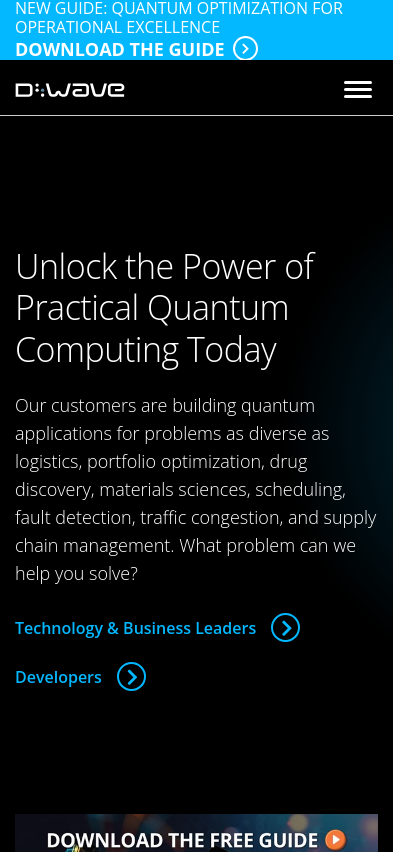
D-Wave Systems designs and manufactures quantum computing and superconducting electronics.
D-Wave Systems, Inc. operates in the quantum computing industry with a specific focus on delivering practical quantum computing solutions tailored for business applications. Their key focus area is quantum optimization, which targets enhancing operational efficiencies across various sectors through the use of quantum computing technologies.
Unique Value Proposition and Strategic Advantage:
-
Full-Stack Quantum Ecosystem: D-Wave offers a complete ecosystem that spans quantum computing systems, software, tools, and services. This full-stack approach ensures that businesses have everything they need to implement quantum solutions, from hardware to deployment.
-
Hybrid Quantum Solutions: The company leverages both classical and quantum computing paradigms, particularly through their hybrid quantum-classical solvers. This blend allows businesses to tackle complex optimization problems more effectively than using either mode alone.
-
Enterprise-Grade Quantum Computers: With systems like the Advantage™ quantum computer, D-Wave provides quantum computing power that is accessible over the cloud, specifically designed to address the needs of business applications, making it a strategic tool for operational enhancements.
Implementation of Value Proposition:
-
Cloud Platform - Leap™ Service: D-Wave's Leap service provides real-time access to their quantum computing systems, enabling organizations to address complex problems almost instantly. This accessibility favors businesses that need fast computational results without the constraints of owning physical quantum hardware.
-
Target Areas for Quantum Optimization:
- Logistics and Supply Chain: Enhancing routing, scheduling, and cargo loading to reduce costs, time, and environmental impact.
- Manufacturing Processes: Optimizing production schedules and resource allocation to boost efficiency and throughput.
- Telecommunications: Improving network management and performance using quantum optimization methods.
-
Professional Services - D-Wave Launch™: This program guides businesses from identifying applicable use cases to the actual deployment of quantum computing applications. With a structured onboarding process, D-Wave ensures businesses can implement and gain value from quantum computing technologies.
-
Open Source Tools and Developer Support: Through the Ocean suite, D-Wave provides open-source Python tools to facilitate the development and deployment of quantum applications. This focus on accessibility is reinforced by community support to engage and educate developers from all backgrounds.
-
Customer Success and Real-World Applications: The company highlights numerous case studies where quantum computing solutions have been successfully applied across industries, showcasing measurable ROI and operational benefits in sectors like finance, logistics, and telecom.
D-Wave markets its products as transitioning quantum computing from a theoretical realm into real-world, enterprise-ready solutions aiming to provide competitive advantage through technological adoption. Their integration of hybrid quantum-classical capabilities targets specific operational challenges, positioning quantum computing not as a distant future capability but as an immediate tool for business enhancement.
Rigetti Computing
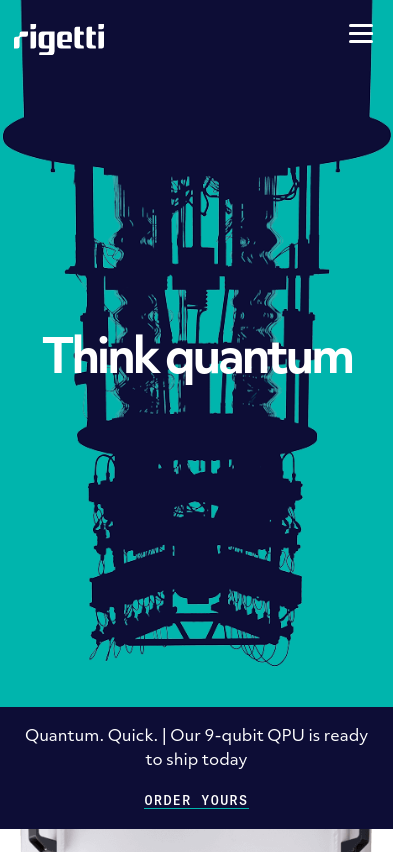
Rigetti Computing is a full-stack quantum computing company that designs and manufactures superconducting quantum integrated circuits, packages and deploys those chips in a low temperature environment, and builds control systems to perform quantum logic operations on them.
Company Overview: Rigetti Computing
1) Key Focus Area
Rigetti Computing is focused on the development and deployment of quantum computing technologies. The company aims to build scalable quantum systems that integrate seamlessly into existing computational infrastructures to solve complex problems across various industries. Their system is designed to work as a specialized co-processor alongside classical computing resources, providing enhanced computational capabilities.
2) Unique Value Proposition and Strategic Advantage
Rigetti offers a full-stack approach to quantum computing, which includes the design, manufacturing, and delivery of quantum computers and their integration into hybrid quantum-classical computing environments. A key component of their strategy is the proprietary Quantum Cloud Services (QCS) platform, which allows users to access Rigetti's quantum processors over the cloud, providing low-latency connectivity and usability akin to traditional co-processors.
The strategic advantage of Rigetti lies in the integration of their hardware and software capabilities. By owning and operating the full stack—from chip design and manufacturing through cloud delivery—they position themselves as a company with control over the entire quantum computing pipeline, potentially reducing risk and enhancing the development speed of their quantum technologies.
3) Delivery on Their Value Proposition
-
Hardware Engineering and Fabrication: Rigetti's technology stack begins with the fabrication of quantum processor chips. Their facility, Fab-1, combines advanced semiconductor technologies with novel machining methods to produce cutting-edge superconducting qubits, critical for quantum computation.
-
Quantum Cloud Services (QCS): This platform facilitates the integration of Rigetti quantum computers in the cloud, providing a hybrid environment for executing quantum programs. By designing QCS to offer ultra-low latency connectivity, Rigetti enhances the performance and practicality of quantum applications for industries looking to leverage these technologies.
-
Research and Development: Rigetti continues to innovate through dedicated research in areas like quantum error correction, algorithm development, and optimization techniques. Their investments in these fields aim to improve operational efficiencies and connectivity between qubits, ultimately increasing the application scope of their quantum processors in real-world scenarios.
-
Software Ecosystem: Rigetti supports a robust ecosystem of software tools that enable users to write and run quantum programs. Key offerings include the Quil SDK, an instruction language, and various simulation and development tools, fostering ease of use and broad adoption across user levels.
-
Collaborations and Partnerships: The company engages with various industry partners to foster innovation and application development, such as collaboration with software platforms like Azure Quantum and Amazon Braket, thus expanding their reach and applicability.
In summary, Rigetti Computing emphasizes a full-stack solution to quantum computing, integrating their hardware, software, and cloud capabilities to deliver advanced computational solutions suited for complex industry use cases, thus maintaining a competitive advantage in the evolving quantum landscape.
Quantum Machines

Quantum Machines is developing operation and control systems for quantum computers - hardware and software that allow to realize the potential of quantum computing.
Key Focus Area
Quantum Machines' primary focus lies in the domain of quantum control engineering, specifically delivering sophisticated solutions for running, optimizing, and scaling quantum computers. Their technologies cater to a broad range of qubit types, including superconducting, optically addressable, and neutral atoms, and pursue applications from basic research to large-scale quantum computing and high-performance computing (HPC).
Unique Value Proposition and Strategic Advantage
Quantum Machines' unique value proposition centers on their state-of-the-art Quantum Orchestration Platform (QOP) and associated products such as OPX1000, OPX+, and QUA, a pulse-level programming language. Their strategic advantage is built upon the integration of cutting-edge hardware capable of real-time processing, ultra-fast feedback and a robust software suite that facilitates seamless programming of quantum algorithms.
Key elements include:
-
Unified System: Their all-in-one quantum control system integrates advanced digital synthesis and an adaptive architecture capable of managing complex quantum computational tasks without the typical low-level FPGA programming.
-
Scalability: Their products are designed for scalability, allowing researchers to upgrade their systems as needed without major reconfigurations or redesigns, which is crucial for both academic institutions and commercial ventures pushing the limits of quantum hardware.
-
Intuitive Programming: The use of QUA enables researchers to write code that resembles pseudo-code, significantly simplifying the complexity associated with developing and testing quantum algorithms.
Delivery on Value Proposition
Quantum Machines delivers its value proposition through a combination of innovative hardware and software solutions that reduce time-to-experiment and are adaptable to various quantum research needs:
-
OPX and OPX+ Controllers: These controllers are designed to handle complex real-time quantum tasks, offering agile and flexible processing. They allow for quick deployment of complex sequences and drastically reduce coding complexity and experimental turnaround time.
-
Pulse Processing Technology: Their Pulse Processing Unit (PPU) technology facilitates classical and quantum processing in real-time, supporting a broad array of advanced quantum algorithms and protocols efficiently.
-
Modular Hardware Systems: Products such as the OPX1000 and Octave provide a modular approach, making it easier to scale systems and integrate various components and instruments tailored to specific experimental needs.
-
Comprehensive Support and Integration: Quantum Machines emphasizes extensive customer support, aiding users in troubleshooting and optimizing custom setups. Moreover, their hardware demonstrates high compatibility, seamlessly integrating with existing laboratory setups and scaling up as necessary.
-
Educational and Resource Support: Quantum Machines offers support materials including tutorials, case studies, and a dedicated customer success team to assist and educate users in maximizing the potential of their systems.
In summary, Quantum Machines seeks to streamline quantum computing processes by providing sophisticated yet user-friendly hardware and software solutions, focused on reducing complexity, time to result, and enhancing the scalability of quantum research infrastructures. They aim to support researchers and industry leaders in pushing technological boundaries and advancing practical applications of quantum computing.
Q-CTRL
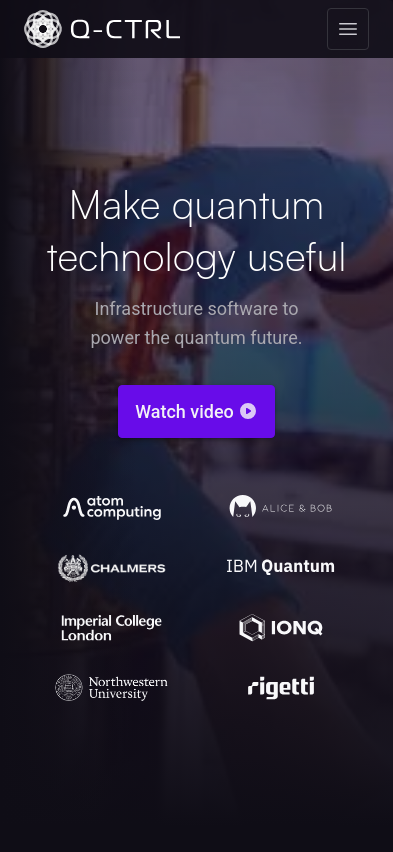
Q-CTRL develops software that reduces error and noise in quantum computing hardware.
Q-CTRL: Summary and Key Insights
-
Key Focus Areas: Q-CTRL is primarily centered on making quantum technology viable for practical applications through quantum control. The company addresses various sectors, including quantum computing, earth observation, sensing, education, defense, and space. Their core offerings include products like Black Opal for learning quantum computing, Fire Opal for quantum algorithm value extraction, Boulder Opal for superior quantum computer building, and Q-CTRL Sensing for detecting complex phenomena.
-
Unique Value Proposition and Strategic Advantage: Q-CTRL distinctively positions itself by providing quantum control solutions that mitigate the intrinsic susceptibility to errors in quantum technology. Through their product lineup, they empower developers and companies to harness the latent capabilities of quantum processors, significantly enhancing hardware performance and algorithmic success. This strategic stance differentiates them in a market where quantum error mitigation is critical and offers substantial cost savings and improved efficiency, purportedly achieving performance enhancements that dramatically surpass standard technologies.
-
Delivery on Value Proposition: To deliver their value proposition, Q-CTRL engineers infrastructure software to augment quantum hardware's performance capably. They employ advanced algorithmic techniques, AI-driven error rectification, and automated error suppression technologies. Through partnerships and integrations with quantum industry leaders like IBM, the company simplifies complex quantum deployments into user-friendly applications, enabling widespread adoption without necessitating deep quantum expertise. Q-CTRL collaborates with various entities, including educational institutions and defense sectors, to apply quantum solutions to real-world challenges, demonstrating substantial improvements in specific cases, such as enhancing military logistics or optimizing data loading in financial computations.
Conclusion: Q-CTRL is heavily invested in advancing quantum technology's practical utility by improving quantum hardware's reliability and effectiveness. Their focus on sophisticated quantum control systems positions them as a competitive player in transitioning quantum computing from theoretical potential to tangible impact across diverse industries. Through their strategic technology stack that simplifies and optimizes quantum computing processes, Q-CTRL aids clients in navigating and capitalizing on the quantum era's opportunities efficiently.
Horizon Quantum
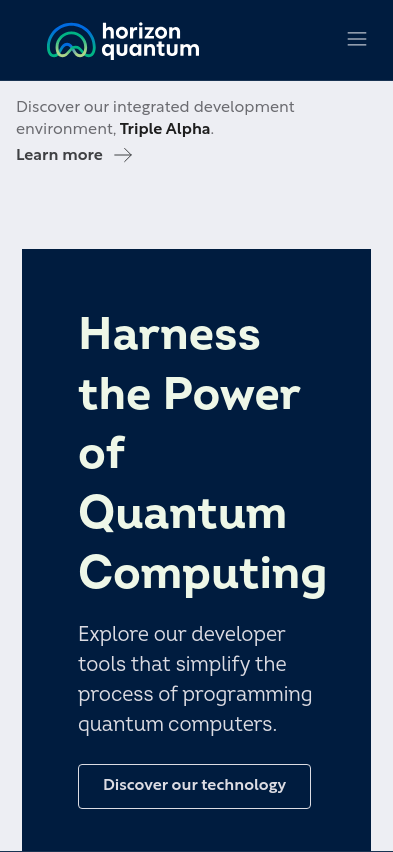
Horizon Quantum is building new tools for quantum computers software development.
Horizon Quantum Computing Overview
1) Key Focus Area: Horizon Quantum Computing is dedicated to advancing quantum software development tools. Its primary focus is simplifying the programming of quantum computers to make them as accessible and functional as traditional computing systems. Understanding that quantum computing has the potential for significant societal impact, Horizon aims to address the challenges faced by the current quantum computing landscape, such as the application bottleneck and talent pool limitations.
2) Unique Value Proposition and Strategic Advantage: Horizon distinguishes itself by offering a unique value proposition through its integrated development environment (IDE) called Triple Alpha. Three main facets define its strategic advantage:
- Automatic Code Transformation: Horizon's tools transform conventional programming code into quantum algorithms, enabling non-experts to leverage quantum computing without needing intricate knowledge of quantum mechanics.
- Modular and Hardware-agnostic System: Horizon advocates for a modular, multi-vendor approach that provides flexibility and the ability for its software to integrate seamlessly with various quantum hardware. This adaptability enhances its appeal for diverse applications and industries.
- Proprietary Software-Hardware Integration: With the establishment of a quantum computing testbed, Horizon can integrate its software with its hardware, pushing the limits of interoperability and control, an approach that is relatively unique in this domain.
3) Delivery on the Value Proposition: Horizon realizes its philosophy through a combination of innovative approaches and strategic partnerships:
-
Triple Alpha IDE: This web-based environment simplifies quantum programming by allowing developers to write, compile, and deploy code on quantum computers. It supports multiple levels of abstraction, includes Turing-complete languages, and integrates subroutines from established languages like C/C++, making it versatile and user-friendly.
-
Algorithm Synthesis: The core capability of automatically generating quantum algorithms from classical code helps bridge the gap between current computational capabilities and potential quantum advantages.
-
Integrated Hardware Testbed: Located in Singapore, Horizon's hardware testbed allows for effective integration and testing of its software systems with multiple quantum computing configurations. This setup ensures that Horizon can directly test and refine its technologies in a real-world environment, enhancing their robustness and wide applicability.
-
Collaborative Ecosystem: By engaging with other quantum technology pioneers and industry leaders, such as Rigetti Computing and Quantum Machines, Horizon aligns itself strategically to ensure its technology remains cutting-edge and its applications remain broad.
In sum, Horizon Quantum Computing leverages its comprehensive suite of development tools and strategic hardware integration to democratize access to quantum computing technology, making it a feasible and practical tool in various computational realms.
QuantWare
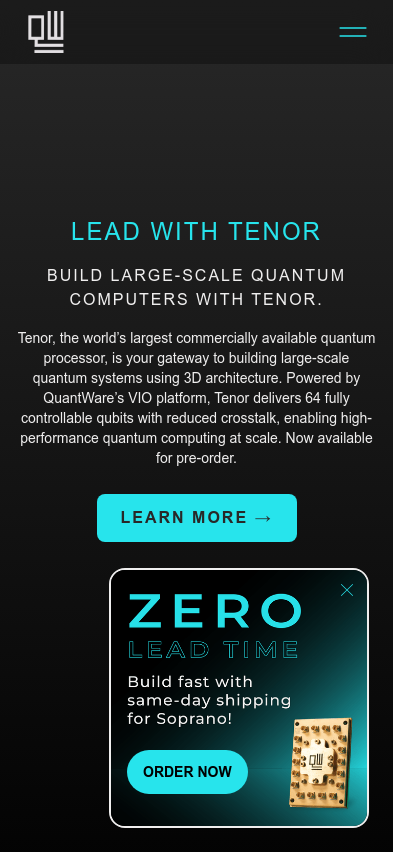
QuantWare designs, develops and fabricates superconducting quantum hardware to accelerate the advent of the quantum computer.
QuantWare: Focus, Proposition, and Methodology
1) Key Focus Area:
QuantWare's central focus is on the development and commercialization of quantum processing units (QPUs) and related quantum computing hardware. By leveraging state-of-the-art superconducting technology, they aim to advance the scalability, accessibility, and performance of quantum computers. Their product offerings include various QPUs like Tenor, Contralto, and Soprano, as well as amplifiers such as the Crescendo series, alongside providing foundry services for custom quantum hardware fabrication.
2) Unique Value Proposition and Strategic Advantage:
QuantWare's unique value proposition lies in their proprietary VIO platform, which facilitates the scaling of quantum processors. This platform enables a reduction in crosstalk and supports the development of large-scale QPUs capable of significantly exceeding the current industry standards. Their strategic advantage is rooted in:
- Scalability: The Tenor QPU, boasting 64 qubits, is marketed as the largest commercially available processor, promising scalable quantum systems.
- Accessibility and Customization: Through their foundry services, QuantWare allows customers to design and fabricate custom quantum chips, making advanced quantum computing more accessible and tailored to specific needs.
- Open Architecture: By adopting a quantum open architecture, QuantWare positions itself as a versatile partner for integrating diverse technologies to build quantum computers.
3) Delivery on Their Value Proposition:
QuantWare delivers on its value proposition through several methods:
- Product Offerings: Their QPU products, such as the Tenor, Contralto, and Soprano, provide varied solutions catering to different scales of quantum computing needs. These products are designed with features like high fidelity, reduced crosstalk, and advanced shielding to ensure performance and reliability.
- Amplifiers and Readout Technology: The Crescendo amplifiers support state-of-the-art qubit readout, crucial for maintaining accuracy in quantum computations. Crescendo-E, developed for industrial-scale operations, offers customization for enterprises needing large-scale, high-fidelity quantum readout capabilities.
- Foundry Services: Through VIO-powered foundry services, QuantWare offers its fabrication technology to enterprises looking to develop and scale quantum designs. This service ensures high-quality fabrication, testing, and packaging tailored to customers' specific requirements, further supported by their advanced component library and targeting algorithms.
- Collaborative Ecosystem: QuantWare’s partnerships with leading quantum technology companies and experts enhance its product capabilities. By integrating advanced tools and embracing collaborations, QuantWare supports customers in achieving faster innovation cycles and maintaining competitive performance benchmarks.
QuantWare positions itself not just as a provider of quantum processors, but as an enabler of quantum innovation and development through its comprehensive ecosystem of products, services, and partnerships.
Super.tech
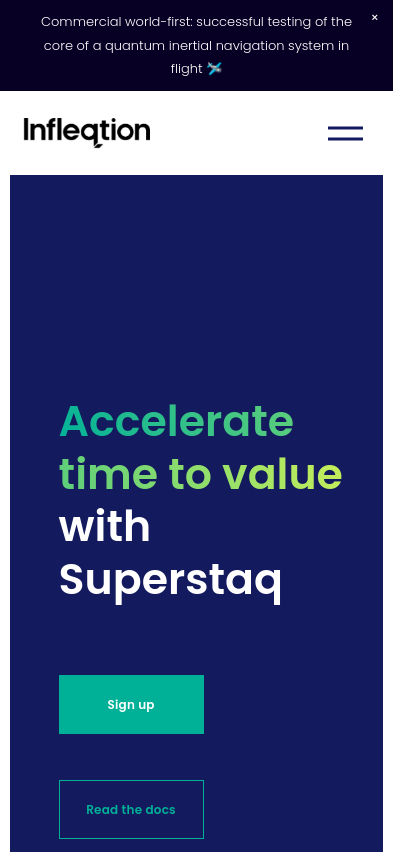
Super.tech develops software that speeds up quantum computing by bridging the gap between applications and hardware.
Key Focus Area:
Super.tech, operating as part of Infleqtion, concentrates on creating quantum computing solutions. Their primary offering is Superstaq, a quantum software platform engineered to leverage optimization techniques across multiple layers of computation to enhance performance.
Unique Value Proposition and Strategic Advantage:
-
Performance Optimization: Superstaq claims to offer substantial performance improvements (up to 10 times more efficient) through cross-layer optimization. This involves advanced techniques such as Dynamical Decoupling which mitigates errors and optimized decomposition methods that fully exploit the native operations of quantum hardware.
-
Universal Accessibility: The platform is designed to support leading quantum computing frameworks like Cirq and Qiskit, enabling users to write programs that can operate across a variety of quantum computing devices — including those produced by IBM, IonQ, and Rigetti — without additional effort. This flexibility is significant in an evolving landscape where hardware compatibility can become a hurdle.
Delivery on Value Proposition:
-
Technical Sophistication: The platform incorporates state-of-the-art methods such as low-level, device-specific optimizations that account for factors like architecture, connectivity, and noise levels. This kind of sophisticated optimization allows it to run more effective quantum algorithms, as demonstrated in the example of enhancing a 4-qubit Bernstein-Vazirani circuit.
-
Developer Resources and Support: Super.tech provides robust resources for developers, including plugins for well-known quantum languages such as Qiskit and Cirq, and access to their OpenAPI. Such resources ensure that developers can easily integrate and leverage the platform for their quantum computing projects.
-
Collaborations and Case Studies: The company emphasizes collaborations with entities like Morningstar and shows practical applications through case studies. These collaborations often focus on specific tasks, such as optimizing the Toffoli gate, reducing algorithm infidelity, or engaging in educational initiatives like the QSCOUT onboarding program, thus highlighting the platform's versatility and applicability in real-world scenarios.
In summary, Super.tech aims to solve the complexities and inefficiencies associated with quantum computing through a software-driven approach, facilitating user access and application development across a diverse range of quantum devices. The company's emphasis on performance gains and compatibility attempts to position its solutions as strategic assets for entities looking to push the boundaries of what quantum computing can achieve in practical applications.
RaiderChip

RaiderChip is developing a hardware IP core to accelerate generative AI inference on FPGA platforms, emphasizing small to large language models.
Company Focus Area
RaiderChip is a hardware design company specializing in developing neural processing units (NPUs) for generative artificial intelligence (AI). The company's primary focus is accelerating large language models (LLM) on low-cost field-programmable gate arrays (FPGAs). These accelerators aim to advance AI processing efficiency and operate generative AI models entirely locally, without requiring cloud or subscription services. RaiderChip aims to target the burgeoning edge AI market, engaging in embedded solutions capable of running independently from internet connections.
Unique Value Proposition and Strategic Advantage
RaiderChip's unique value proposition lies in offering clients a cost-effective, local AI acceleration solution that prioritizes privacy and efficiency. Their strategic advantage comes from leveraging decades of experience in low-level hardware design to deliver NPUs that maximize memory bandwidth and computational performance, essential for running complex generative AI models efficiently. RaiderChip offers versatile and target-agnostic solutions that work seamlessly with FPGAs and ASIC devices from various suppliers such as Intel-Altera and AMD-Xilinx.
Key differentiators include:
- Fully hardware-based generative AI acceleration, ensuring deterministic performance and energy efficiency.
- Capability to run models offline to ensure data privacy and independent operations, ideal for applications in sensitive areas such as defense, healthcare, and consumer electronics.
- Support for rapid integration of new LLMs and customer-specific fine-tuned AI models without hardware modifications.
Delivering on Their Value Proposition
To drive its mission forward, RaiderChip focuses on several key strategies:
-
Advanced Technology and Design: Their NPUs are specifically optimized for the Transformers architecture, which is foundational for the majority of LLMs. This allows them to process models without the need for additional CPUs or Internet connections.
-
FPGA-based Approach: RaiderChip uses the reprogrammable nature of FPGAs, making their deployed systems adaptable to emerging AI models and updates without significant hardware changes.
-
Quantization Support: By offering models with full floating-point precision and quantized variants, RaiderChip caters to diverse computational needs, providing flexibility and efficiency, especially in resource-constrained environments.
-
Local and Interactive Evaluations: RaiderChip provides interactive demos that allow potential customers to test and evaluate the capabilities of their generative AI solutions, emphasizing a hands-on approach.
-
Frequent Model Support Expansion: Aligning with market trends, they consistently add support for new models like Meta’s latest Llama releases and Falcon from TII of Abu Dhabi, enabling versatile AI applications across different languages and regions.
RaiderChip’s investments in research and development are supported by their recent seed round of one million Euros, further accelerating their growth in a field that continuously evolves with rapid technological advancements. By focusing on local AI acceleration for both performance and privacy, RaiderChip positions itself as a pioneer in generative AI deployment, particularly for applications requiring significant computation near the source of data generation or decision-making.
